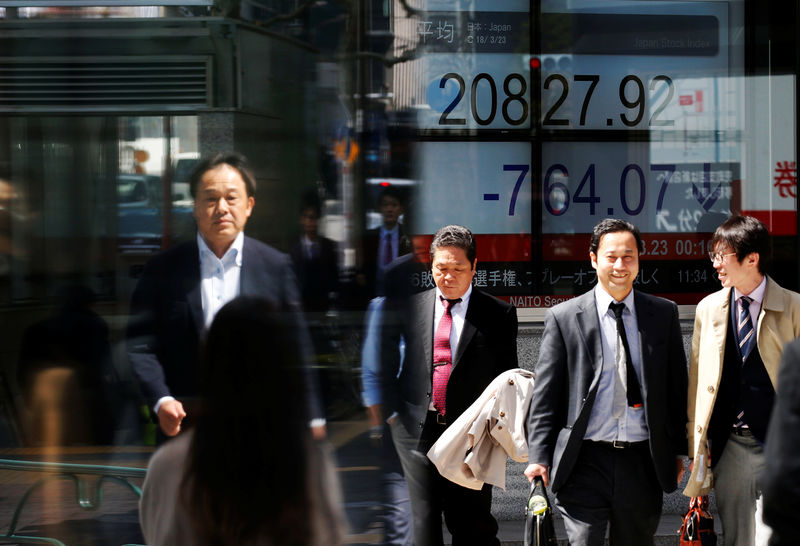By Wayne Cole
SYDNEY (Reuters) - Most Asian share markets crept cautiously higher on Monday as investors awaited developments on proposed Sino-U.S. trade talks and the Chinese yuan rallied away from alarming lows.
Spreadbetters pointed to a mildly positive start for European shares with FTSE futures (FFIc1) up 0.1 percent. Eurostoxx 50 futures (STXEc1) opened 0.3 percent higher.
MSCI's broadest index of Asia-Pacific shares outside Japan (MIAPJ0000PUS) climbed 0.6 percent. Hong Kong's Hang Seng index (HSI) added 0.9 percent.
Moves were modest elsewhere with Shanghai blue chips (CSI300) barely changed and Japan's Nikkei (N225) ending 0.3 percent lower in thin trade. EMini futures for the S&P 500 (ESc1) were flat.
The yuan reached its highest in a week at 6.8450 per dollar <CNY=CFXS> as Beijing acted to prevent a test of the psychologically important 7.0000 level.
Investors were also encouraged by news China and the United States will hold lower-level trade talks this month, offering hope that they might resolve an escalating tariff war.
Reports suggested the talks in Washington would take place on Aug. 21 and 22, just before U.S. tariffs on $16 billion of Chinese goods take effect.
The U.S. Trade Representative's office said on Friday it doubled the length of tariff hearings on the next $200 billion worth of Chinese goods to six days from the previously planned three due to overwhelming demand from companies to testify.
The hearings will be held Aug. 20-24 and on Aug. 27.
Dealers cited speculation the talks could set the stage for a summit between U.S. President Donald Trump and Chinese President Xi Jinping in November.
"Although such a timeline for agreement is totally unrealistic given how far apart the two sides are, the positive headlines should help sentiment to improve and a positioning unwind of USD is possible," said analysts at JPMorgan (NYSE:JPM).
"This would set Emerging Market Asia equities up for a short-term squeeze, with HK/China yuan sensitives likely leading the way higher."
STEADY FOR NOW
Helping the general mood was a steadying in the Turkish lira, which was holding around 6.06 per dollar <TRYTOM=D3> on Monday.
Qatar and Turkey's central banks have signed a currency swap to provide liquidity and support for financial stability, Qatar's central bank said on Sunday.
"Sentiment toward Turkey has stabilised, but medium-term vulnerabilities remain substantial and markets continue to penalise currencies with weak fundamentals," cautioned Barclays (LON:BARC) economist Michael Gapen.
"But we see contagion risk from Turkey as a relatively low-risk outcome. History indicates emerging market volatility is unlikely to knock the U.S. economy, or the Fed, off course."
Minutes of the Federal Reserve's August policy meeting are due on Wednesday and should show policy makers are upbeat on the economy and committed to further gradual rate hikes.
Federal Reserve Chair Jerome Powell and other central bankers meet at Jackson Hole, Wyoming, from Friday to discuss the root causes of stubbornly low inflation, slow wage growth and lethargic productivity gains.
The prospect of yet higher U.S. rates had been underpinning the dollar, though the currency took a knock on Friday as risk appetite improved just a little.
The dollar index (DXY) was a fraction firmer at 96.27 on Monday, having fallen almost 0.6 percent at the end of last week.
The euro held at $1.1430 (EUR=) after bouncing from a 13-month trough at $1.1297 last week, while the dollar was idling at 110.55 yen <JPY=> and just above recent lows at 110.11/31.
In commodity markets, gold was 0.1 percent higher at $1,186.02 an ounce <XAU=> having suffered its largest weekly loss since May 2017. It hit a 19-month low at $1,159.96 last week.
The upward trend in the U.S. dollar has also pressured oil, with U.S. crude down for a seventh consecutive week and global benchmark Brent off for a third week. [O/R]

On Monday, Brent was 13 cents lower at $71.70 a barrel (LCc1), while U.S. crude eased 11 cents to $65.80 (CLc1).